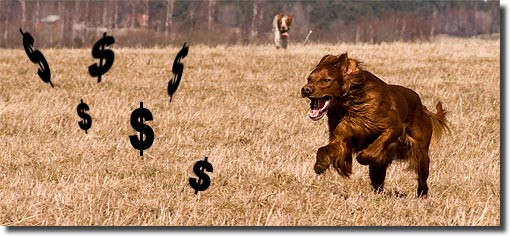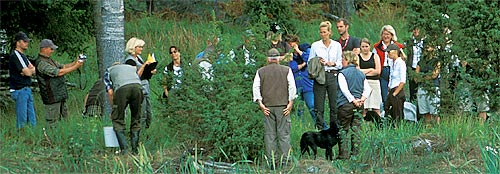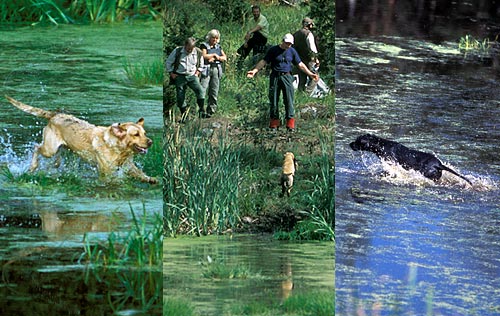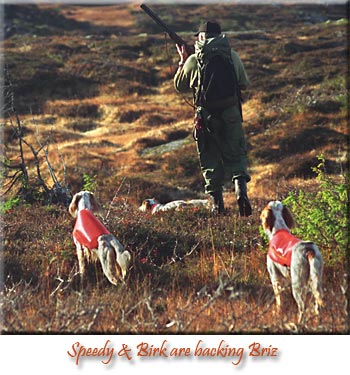
Provided the natural practical prerequisite for training a British birddog is lacking,
the training will sooner than expected become very expensive!
| Books have been written about how to successfully train a gundog. I do not know enough about dog training to write still another book about the subject. However I have from my own and other folk's mistakes and failures learned how to fail with my dog, learned why so very few people produce fully trained and fully functional gundogs. Few gundogs are used to their full potential and there are good reasons for this fact. Before we go further in the discussion we must agree about a simple fact: A dogs performance is the sum of its genetic heritage and the environment it was brought up in and lives in. In order to get a dog of a very high quality you must have a good genetic heritage and a good environment for it to develop in. You must have both; one cannot do without the other! It is the same as with formula race cars. The car itself must be excellent when it comes from the factory. Still it will not win any races unless it will be driven by the skilful driver and adjusted by a skilful team of mechanics and engineers. The car itself will do nothing spectacular until it gets into the good environment. To make things simple lets assume that our puppy is genetically sound and suitable for the work we want it to do, provided we offer it the environment it needs for its development. Breeding good puppies is a science of its own and I am not the one to deeply discus that matter. So we start with a puppy that is good enough! Lets say our trainer is a novice but enthusiastic young person with a limited economy as most of us have. Now what could go wrong along the narrow road this trainer has to walk on? It is difficult to give a value to every mistake this enthusiastic person will make. The mistakes can be done in as many ways as there are novice trainers so I will just list them as they pop up in my mind. It might be a good method to present them as any other. (Now, when I write "he" it also means "she", there is no sexual discrimination from my part J) Finally; the difficulties I describe are seen from a Scandinavian point of view. In other parts of the world other difficulties might hamper the development of good dogs. 1. The novice trainer has no vision, no precise aim with his work. He has perhaps seen a lot of dogs of his breed in work but he has never seen the best of the best of his breed. Hence he might aim for the treetops but he does not aim for the stars, where his aim should be if he wanted to reach the stars! He must learn the position of the stars in order to reach them. 2. The novice trainer does not know how to listen to knowledge from the outside. In order to really listen you must be able to put aside the view of the world that you have built in the past, and hence the view where you have your security. To really listen can be frightening but it is only by really listening that one can learn! 3. The novice trainer does not know who to listen to. If he is enthusiastic he will go to many places, many churches and many mosques. Once people learn that he is a novice trainer he will get an endless number of more or less good advice and words of the Lord/Allah. Before he has learned to discriminate most of the advice he gets, he has already done enough of mistakes to perhaps permanently ruin the dog! 4. The novice trainer will follow the last advice he got. Even if it does not work he will try it again and again. He has forgotten about the 8 advises back when someone said: If an advice or method does not work - try something else! 5. If the novice trainer, who has no own rural land, is training a spaniel or retriever, he could have a fair change to, in one way or the other, through friends, relatives or other family members, to get permission to arrange decent training grounds and in fact train the dog to a certain degree. Spaniels and retrievers can be trained on a rather unpretentious piece of land if some imagination can be added to the training. However, the owner of a pointing birddog of a wide ranging British breed will find, sooner or later, that he is in a big trouble trying to run it on a small piece of land! |

| This large grain field might at a first glance look like the perfect place to train a wide-ranging setter. Well it is not. It is on 3 sides surrounded by roads with a lot of traffic. It is highly likely that your young dog will sooner or later end up in the traffic and get killed. When the grain is harvested in the modern way the stubble will be left too short to provide any shelter for the game. | After harvest it is today a common practice in the modern agriculture to plough within days after harvest, thereby turning the field into black, sterile soil, leaving no incentive for any game to settle down. In fact it will even be useless to put out any game on it. Unfortunately this is the common picture all over Sweden.
|


| This 5 hectare large, artificially made pond was created with around the same cost as the cost of training a pair of British pointing dogs during 5 years! The cost of the pond is a once in a lifetime investment and the quality of this pond is good enough to use for field trials of elite grade retrievers, as seen here. The pond also provides good shooting of wild ducks every autumn and gives food, shelter and breeding grounds for numerous birds of many | different spices. With this rather low investment you can train a great number of spaniels and retrievers into a very high standard during a lifetime. You could even hire the pond to other handlers and thereby pay for the low running cost of the pond that could consist of put out pheasants and their feeders, predator traps and similar should you find the natural bird life insufficient for you activities. |
| 6. OK. The novice trainer finally got a decent piece of land to train on but there is no game on it. If he is training a moose- or deerhound he might throw in the towel right away. If he is training a spaniel or a birddog he can use reared, planted or putout birds. If he uses reared, planted birds he needs a steady supply. He can of course learn to breed them either from eggs or from young chickens. He needs all the equipment and housings and also some skill. In addition he needs to use money from, remember what we said, a limited economy! He could also buy older birds, ready to put out. In that case the birds are bred about 300 km south from where he lives while the training grounds he has got permission to use are located 250 km north from his home. Now we can really start to ad some gasoline and other car cost, not to mention time, to his dog-training budget. It is now time to start to drop golf, bowling, visiting far away relatives, neglecting restaurant visit, hamburgers, soft drinks, beer and expensive whisky and wine from the everyday consumption. Selling that heavy drinking 8-cylinder gasoline powered full size SUV in favour to a small 4-cylinder diesel driven ditto will soon come into consideration. Unfortunately other owners of gasoline drinking full size SUVīs have made the same discovery as our trainer so the second hand market is crowded with such cars causing the second hand prices to drop dramatically while the diesels increase in price. 7. After some time of training the dog on the planted or putout birds, our novice trainer finds that the dog might develop better if wild birds could be used. He decides to improve the environment so that a wild population can develop from the birds he put out. He might get permission from the landowner to do some conservation work like killing predators, arranging feeders and call pens. He might even pay the landowner some money so that he leaves beetle banks in and around the fields and he arranges for pools of rainwater to form. The problem is that he forgot to check the neighbours to the land. There might be some folks who do not like the idea of having someone who trains a dog for hunting. They do not care much about who's land they trespass but they will make sabotage to all the effort our trainer puts down in trying to improve the habitat for the birds. 8. A number of failures later the novice trainer gives up the idea of trying to make training grounds of his own. He decides to buy training time from the big estates that offer commercial shooting. After the commercial shooting season is over they usually sell dog-training time on the birds that are left on the ground. You can even shoot one or two if you like, of course you pay by the fired cartridge, not by what you kill. When our trainer has visited 10 such far away shooting estates and paid a fortune for the training time he has found that after the commercial shooting is over there are few, if any birds left. 9. Now our novice trainer, as a last desperate move, decides to go to the deep forest or the mountains to train on truly wild birds. He has to drive 700 or 1200km one-way. If he goes to the deep forest he will find two things. His dog ranges too wide and the birds, should the dog find them in shooting range, are too smart and too fast for him and his dog, btw the dog does not respect the flushed bird. He goes to the mountains. He finds no birds on the area despite of what the rumour says; "This is a good grouse area this year!". The daily cost is still the same, no matter how many or how few birds his dog finds. Not that it matters much, his dog runs wild and has no respect for the flushed covey of grouse anyway. The novice trainer is lucky if he can steer clear of a nervous breakdown. 10. Finally, even if everything I have stated in the 9 previous points should prove to be false, and our novice trainer is a very wealthy man or woman who can afford to buy both the best of training grounds and the best of professional instructors to help him or her, everything can still go wrong. If our trainer, against his or her knowledge, and this happens from time to time, can not fully concentrate on the dog when it is out working, then no money or no outside knowledge can help our trainer to develop the full potential in the promising puppy. If the call from the family, friends or relatives is stronger than the will to develop the dog, or the call from the mobile phone in the pocket is strong enough to break your concentration, or your desire to chat with your training partner is stronger than your will to follow, work with and direct your dog, then you are bound to have to stick to be the second best or worse every time you try to trial your dog, in a field trial or in real life! This is the truth, the whole truth and nothing but the truth. In order to be successful there must be nothing between you and your dog while it is out working for you and hopefully with you! Money can buy you the right of the physical disposal of a dog. Money cannot buy you the respect from the dog, which is something you must earn. These are some of the consequences you get when you cannot control all these elements or perhaps not even one or two of them. When you are out of control of something you will get stressed. Your dog very easily catches this stress. When a stressed novice trainer tries to train a stressed young dog nothing good will come out of it. The basic fault our novice trainer made in the past was to choose the breed of gundog before finding out about the absolute minimum conditions needed for training it. This is really something that is worth to consider. Can you sacrifice the speed, style and beauty of a British birddog, or some other admirable quality in some other breed, in exchange for another, less demanding breed, that you have the practical prerequisite to successfully train? |

photo Torsti Mäkinen & Maud Matsson, text Torsti Mäkinen ©